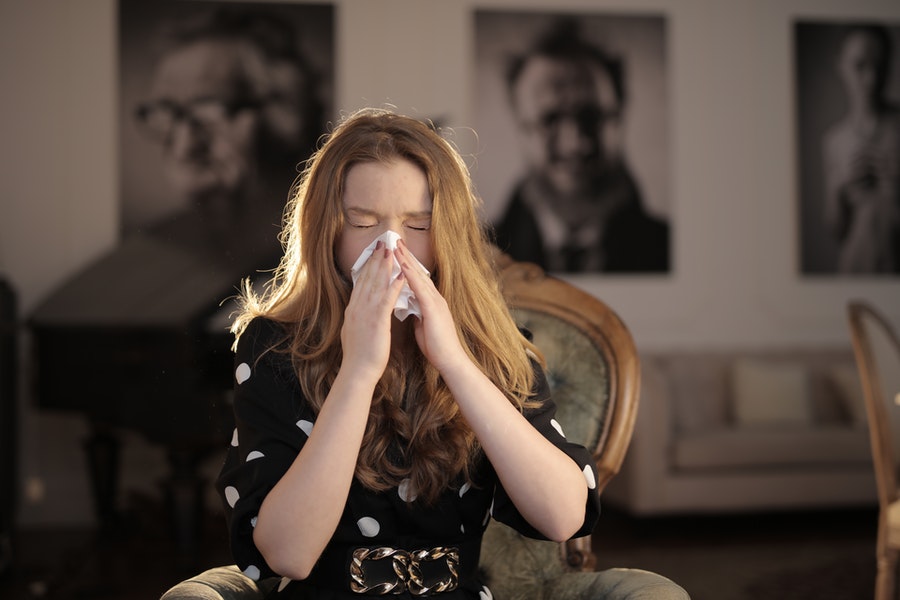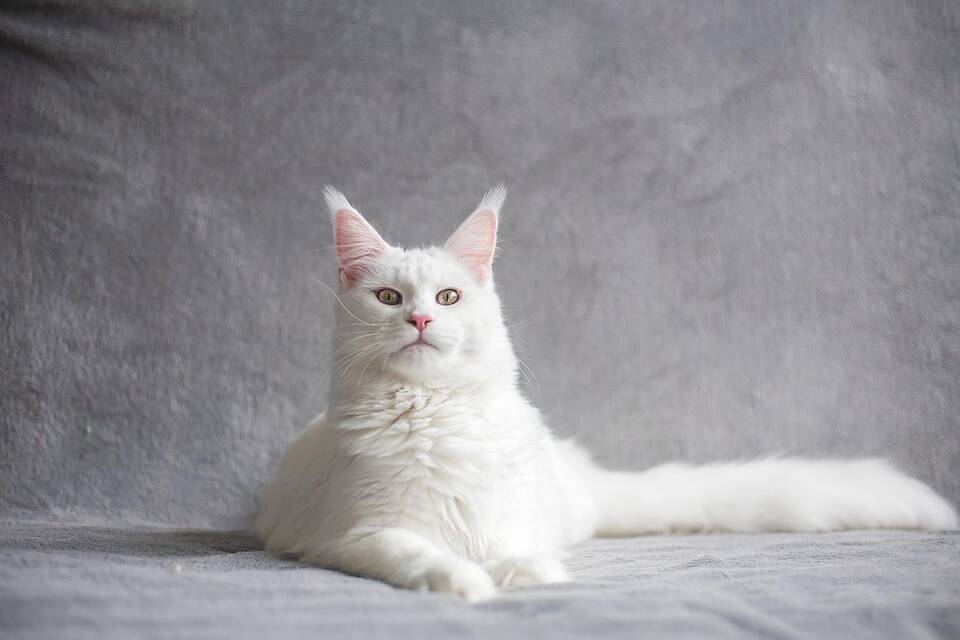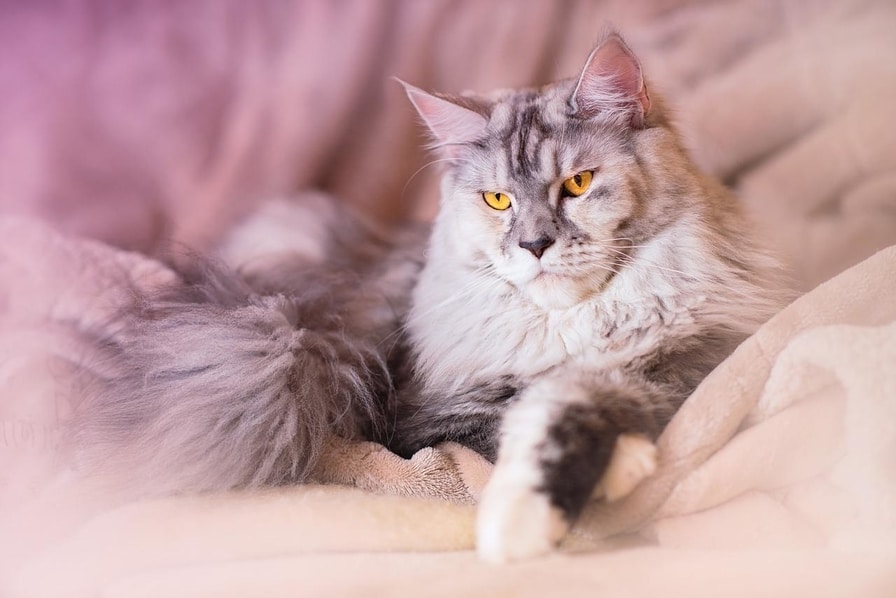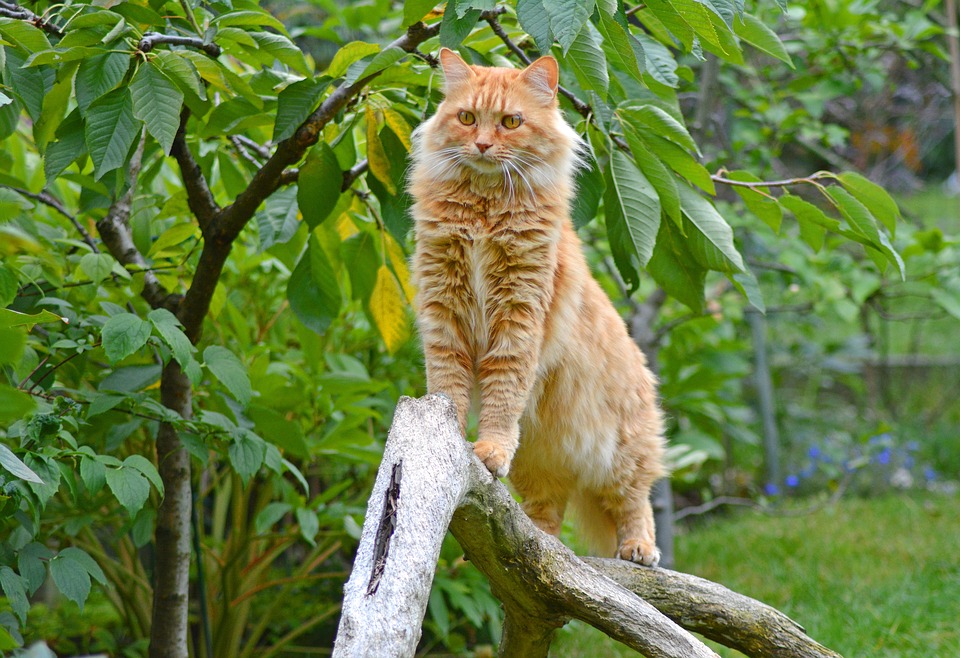A Maine Coon cat is considered one of the most elegant cats in the world. It would be absolutely heartbreaking to take one home and then realize you’re allergic to your new furbaby. If you’re thinking about buying one soon you may be wondering, are Maine Coons hypoallergenic?
Well in this article we are going to go in-depth into the topic and explain everything we know about Maine Coons and whether they are less likely to cause allergic reactions.
Are Maine Coons Hypoallergenic?
Simply put there is no such thing as a hypoallergenic Maine Coon. The reason they are not hypoallergenic is that every cat, not just Maine Coons, has proteins in their saliva, dander, and urine which people are allergic to. Contrary to what you may believe, people are not allergic to cat hairs or fur, it’s the proteins in their bodily fluid.
So now that you know that a Maine Coon cat is not hypoallergenic. Let’s find out more about what causes Maine Coon allergies and ways to prevent them.
What Causes Cat Allergies?
As many as 3 in 10 Americans have allergic reactions to cats. That’s nearly 110 million people that can’t be around cats without sneezing(joke). If you applied those figures to the population of the world that’s nearly 2.4 billion people that are allergic to cats.
But what’s actually causing these allergies?
Allergies from a Maine Coon cat and other cats are caused by a protein named Fel d 1. This protein is present in the bodily fluids of cats mainly in the saliva, urine, and dander.
People with cat allergies have overly sensitive immune systems and are very sensitive to Fel d 1. When they come into contact with this substance their body mistakes it as a harmful threat and triggers the immune system to help fight it. That’s what causes symptoms which we will talk about next.
In general, any animal that carries these Fel d 1 proteins can cause allergic reactions, you may even be allergic to your dog because they carry them too.
How Cat Saliva Triggers Allergy Symptoms
The reason a Maine Coons saliva triggers allergies is that it contains Fel d 1. A protein that people with allergies are allergic to. Basically, if your cat licks you it will surely trigger symptoms.
That’s before taking into consideration the fact that cats groom themselves by licking their coats. So it’s essentially a double whammy of Fel d 1.
How Maine Coon Urine Triggers Allergy Symptoms
Maine coon urine contains concentrated traces of Fel d 1 which is the main culprit for triggering allergies in people.
Whenever your cat takes a pee in its litter box, Fel d 1 becomes airborne and that’s how it spreads. It’s also important to note that when a cat pees it covers the pee with its paws which in turn leads to traces of urine on the cat’s paws and fur. Then the cat walks around your house(you can see where we’re going with this).
How Cat Dander Triggers Allergy Symptoms
Dander, also known as skin follicles contains Fel d 1. The main reason why cats trigger allergic reactions in people. Your Maine Coon cat, as well as all animals, are constantly shedding skin and the skin is being spread around especially as skin particles are attached to hair follicles.
To add flame to the fire, cats also go through shedding phases where they lose coat hair at an increased rate. Which leads to even more dander around the house.
Cat Allergy Symptoms
There are a host of cat allergy symptoms that people may experience. Most of them are rather obvious but if you find yourself experiencing them anytime you’re around a cat, it’s pretty much a given that you have cat allergies.
The symptoms include:
- Sneezing
- Irritated nose including stuffy, itchy, and runny.
- Rash or hives including red itchy eyes
- Coughing and wheezing
- Inflamed red skin after a cat licks or scratches you
Now that we know the symptoms, let’s talk about how to know if you’ve got a cat allergy.
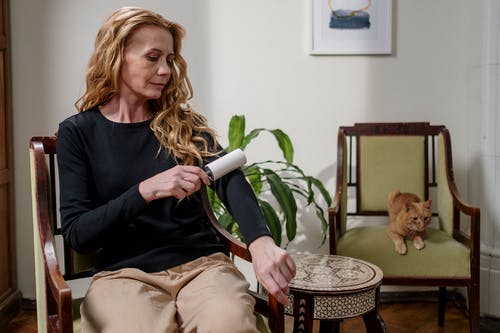
How Do I Know If I Have A Cat Allergy?
It can be easy to label the little furball as the culprit of your wheezing and coughing, after all the systems are quite obvious.
However, if you want to know for certain if you are allergic to your cat, your doctor can give you a blood test to determine if you are allergic to Fel d 1.
Is There A Vaccine For Cat Allergies?
Yes, there is a vaccine currently in testing that reduces the level of Fel d 1 in cat tears and other bodily fluids.
The vaccine is called HypoCat and is being made by a Swiss company called Saiba Animal Health. HypoCat™ has been tested and was found to reduce allergic symptoms in 10 cat owners.
This could be great news for allergy sufferers everywhere!
Ways To Reduce Allergies Around The Home
If you are allergic to cats and are content with living with your Maine Coon regardless. You can try out some of these ways to reduce cat allergies in the home.
Everyone’s allergies vary and have different triggers so we’ve made a list of possible things you can do to reduce the likelihood of your Maine Coone cat triggering your cat allergies.
Stroke Then Wash
As cat owners, we all love to stroke our friendly felines. But stroking your Maine Coon means you’ll have a ton of Fel d 1 on your hands and fingers. So the best counter to this is to not stroke your cat at all 😥 or reduce the number of times you stroke your cat.
If you do get tempted by their extreme cuteness make sure to clean your hands and arms immediately and avoid touching your eyes or mouth before you wash your hands.
No Licking
As mentioned previously, Fel d 1 can be found in a Maine Coons saliva so it’s best not to let your cat lick you.
If it does manage to lick you make sure to wash your hands or wherever it licks you to prevent a potential allergic outbreak.
Hoover Daily
Your Maine Coons hair gets everywhere so make sure to hoover your home regularly. This means hoovering anything the cat plays on including your bed and the cat’s bed.
Also, if you keep a cat condo or climbing frame make sure to hoover this. Cat condos are serious dander dumps. If you’re not convinced, take a close look at your cat’s condo now. Most cat condos are covered in a soft fluffy fabric that’s an absolute hair magnet.
Bathing Is Important
This is one where you need to tread with caution. Because if your cat doesn’t like being bathed, it will let you know. Think claws and lots of scratching and meowing. Our Maine Coon absolutely hates being bathed, my wife found out the hard way.
However, if you know your Coon doesn’t mind getting under the water you can bathe them regularly to keep their coats clean.
Keep The Litter Box Clean
We all know regularly emptying the cat litter box is important but if you find yourself or a loved one suffering from allergic reactions it’s best to clean the litter box as soon as you notice your Maine Coon has used it.
This prevents cat allergens from becoming airborne and potentially causing a reaction.
Buy a Covered Litter Box
As mentioned in the previous point, allergens from the litter box become airborne and can trigger allergy symptoms. If you want to go a step further you can buy litter boxes with covers on them. These boxes can also help reduce allergens from becoming airborne by keeping them somewhat trapped under the cover.
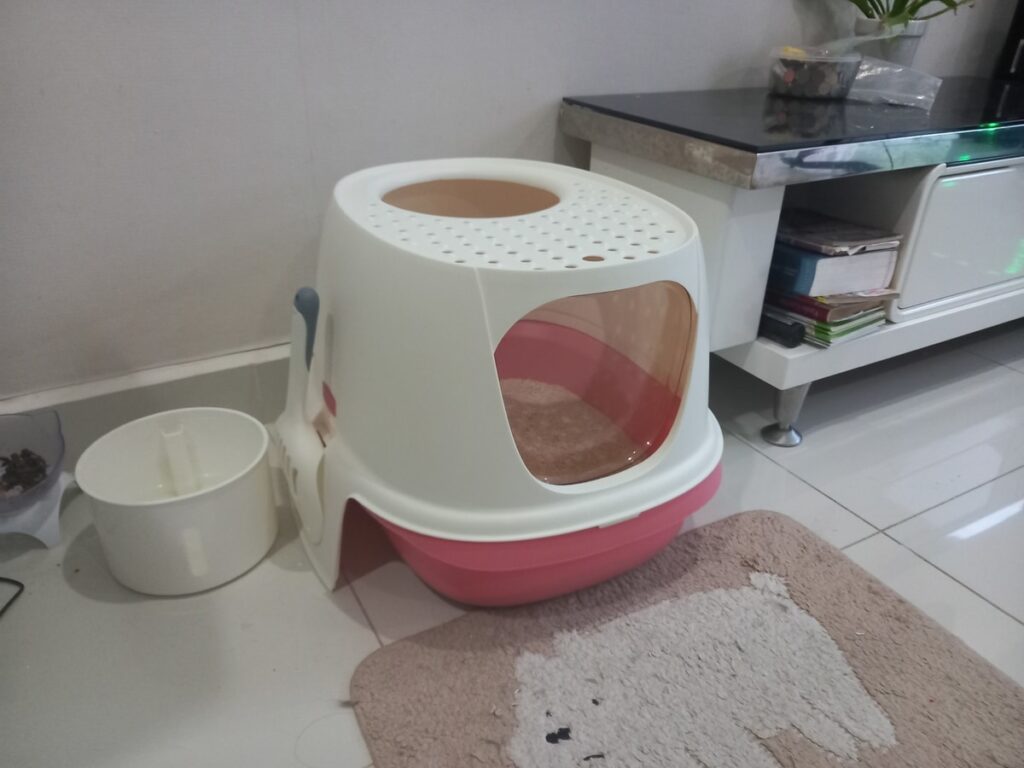
Don’t Let The Cat Into The Bedrooms
We all love cuddling up to a Maine Coons soft warm fur while we sleep or take a nap. Maine coons love it too!
However, doing this leaves hair and dander all over the bed. Similar to the cat condo we mentioned above.
Bed sheets attract hair like no other. So make house rules where you keep the cat off the beds. One of our neighbors doesn’t even let their cat upstairs so it never gets anywhere near the bedrooms.
However, this might be quite difficult if you live in a small or even a studio apartment where it’s damn near impossible to keep your cat off the bed. If so we recommend regularly hoovering the bed and cleaning your bedsheets to clear any unwanted fur.
Ensure Adequate Room Ventilation
Often dander and Fel d 1 can become airborne so make sure to always keep the rooms in your house ventilated. This is as simple as opening windows for an hour a day or every morning to keep the air fresh.
Wear Gloves While Grooming
Wearing gloves while you groom your Maine Coon(that rhymes) can really help keep any proteins off your hands. Remember, we touch our faces a lot more than we realize so any barrier between our hands and the cat’s fur will greatly prevent symptoms from arising.
Also, grooming your cat regularly will prevent fur from spreading around the home. Try to groom your cat at least once per day.
Cat Wipes May Help
As mentioned previously, when bathing or cleaning your Maine Coons fur it may not be welcomed by your grumpy kitty. So using cat wipes may be a great alternative to bathing them. They are pretty much baby wipes for cats and they work wonders.
Try Antihistamines
Most people that are allergic to cats are prescribed antihistamines by their doctor or pharmacist. So make sure you are taking yours regularly to reduce cat allergy symptoms.
Sofa Throws Help
Covering your sofa with a throw can really help in the build-up of cat hairs especially if you have a fabric sofa. We have a leather sofa and we still keep a throw over it to prevent our Maine Coon cat from sitting on it.
Keep Your Coon Outside
Lots of people who own cats do this so don’t feel shamed for doing it. Some people love cats but have small children with cat allergies so it’s simply not worth the hassle to keep their kitties in the house often.
While I was growing up my mum kept our cat outside in a shed in the back garden. The cat lived for 18 years and would start crying when it was brought inside. People tend to forget that cats are covered in fur to withstand cold weather, especially the glorious Maine Coon.
You can plan an hour or two a day when your cat comes inside and plays for a while. If you’re going to go down this route I would highly recommend getting a shed or outhouse that your cat can sleep in at night.
We recommended leaving the cat’s food inside to prevent pests from spoiling it.
Training
This could be a cute little activity to undertake with your cat. After all, aren’t Maine Coons the dogs of the cat world? Training them so they know not to sit on the sofas or beds can be very effective in preventing the spread of hair and dander.
How To Treat Allergies
The treatment of cat allergies is typically handled in two ways. One, your doctor or pharmacist prescribes an antihistamine that comes in a tablet or a nasal spray.
Antihistamines are also available over the counter and don’t require a prescription.
Two, Decongestants such as Sudafed which contains pseudoephedrine.
There’s also the possibility of taking allergy shots but according to webmd, they may or may not work.
Do Maine Coons Produce Less Dander?
No, Maine Coons produce just as much dander as any other cat.
Maine Coons are simply not hypoallergenic which means there is no evidence to suggest that they are less allergic than other breeds of cat.
Conclusion
So now you know Maine Coons are not hypoallergenic. Just remember that it’s not actually the hair or fur that you’re allergic to, it’s the presence of Fed d 1 in your Maine Coons urine, dander, and saliva.
But now you’ve got the scoop on coon cat allergies, you’re armed with the knowledge to prevent that pesky substance from ruining your relationship with the most mysterious cat in the world, the Maine Coon.
Make sure to take a look around the site for even more awesome Maine Coone guides, tips, and advice.
Elliot is the owner and lead writer at Lais Lairs. He is the proud owner of a Maine Coon/Siberian Mix cat named Lai. His oldest cat lived to be 18 years old so he’s learned a thing or two about keeping pets. When he’s not writing you can find him playing video games or playing fetch with Lai.
